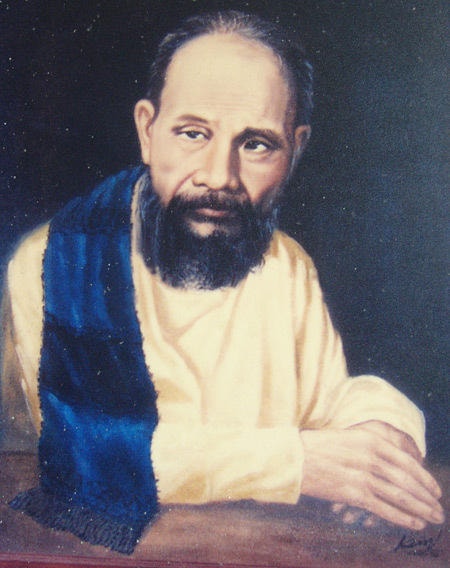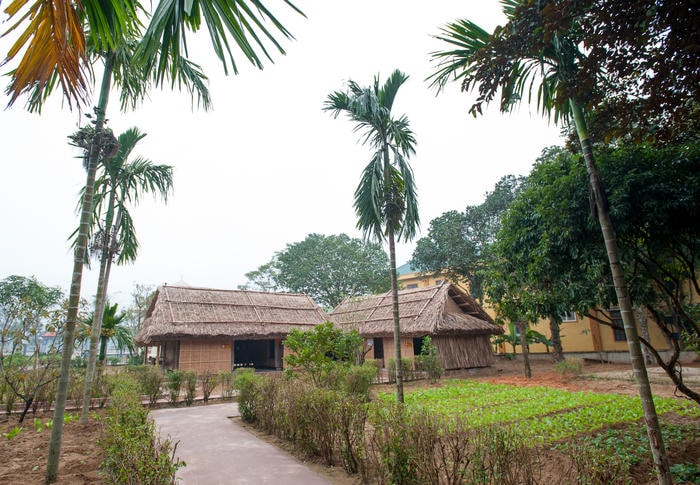Phan Boi Chau - hero, angel of the nation
(Baonghean) - In the late 19th century, the Can Vuong flag was suppressed by the French and led to complete failure. History placed a new and extremely urgent requirement on the patriots at that time: to find a new and suitable way to save the country to continue to complete the cause of national liberation. Phan Boi Chau appeared at that moment. His image shone like the brightest star and was trusted by millions of Vietnamese people.
Phan Boi Chau's real name was Phan Van San, nickname Sao Nam, born in 1867, in Sao Nam hamlet, Dan Nhiem village - now Xuan Hoa commune, Nam Dan district (Nghe An). Growing up in a rural area with a rich tradition of learning and patriotism, in just 3 days the boy San had memorized the "Tam Tu Kinh" with hundreds of pages. Passionate about learning and strangely intelligent, at the age of 16, Phan was the top student in the province 3 times; at the age of 17, he wrote the proclamation "Binh Tay Thu Bac".
 |
| Patriot Phan Boi Chau. |
In 1898, after being wrongly accused of “hoai hiep van tu” (carrying documents in his shirt) and sentenced to “Chung mau bat dac ung thi” (meaning he would never be allowed to take exams again for life), Phan packed his bags and went to Hue as a teacher, but in reality he wanted to meet with famous scholars and high-ranking officials holding important positions in the capital to find like-minded people.
At the Imperial Academy, Phan wrote a poem with his fellow students: "I bow to you as my brother". The poem caused a great stir among the literati and mandarins of that time:
“A true man never gives up, a supreme being never wavers!
The pillar of heaven, setting an example of eternal morality
The sound echoed on the ground, awakening the literary world of two regions!…”.
The poem made Khieu Nang Tinh admire him and intervene with the court to remove the sentence of "hoai hiep van tu" for Phan Van San.
In 1900, Phan returned to his hometown of Nghe An to take the regional exam and passed with the praise of “One name on the board, famous in the literary world”. From here, he officially entered the revolutionary life with the name Phan Boi Chau.
For the first time in the history of the Vietnamese revolution, a pair of eyes looked straight out to the ocean to reach a new horizon, a new ideal of national salvation. Phan Boi Chau raised high the Duy Tan flag with the policy of armed violence and the creation of a united bloc of the entire people: "Fire your passion can dry up the sea/Rely on solidarity to mend the sky".
In order to carry out that spirit, one day in early 1905, Phan and his two friends, Dang Tu Kinh and Tang Bat Ho, left, starting 20 years of wandering to find a way to save the country. Phan came to Japan, the land of cherry blossoms - the most prosperous country in Asia at that time. The purpose of Duy Tan Hoi changed from asking for help to seeking education, which marked the formation of a new movement in Japan: the Dong Du movement.
The Dong Du campaign initiated by Phan Boi Chau sparked a strong patriotic movement abroad that was unprecedented in history at that time. Hundreds of young people "threw away all their books and literature... left their villages, wives and children, crossed thousands of streams, disregarding all hardships and dangers to go to Japan and Siam to study and plan to fight the French."
In Japan, the Vietnamese patriot met a number of important people who were willing to support Phan Boi Chau on his patriotic journey. These included Okumura, Kashiwabara Buntaro, and especially Dr. Asaba Sakitaro. When the French colonialists forced Japan to expel all the Dong Du students, they were almost at the end of their rope. At that moment, Dr. Asaba saved Phan and his comrades. This kindness made Phan Boi Chau extremely grateful. Nine years later, when Phan Boi Chau returned to Japan to thank the doctor, he had passed away after a serious illness. Too sad and regretful, Phan Boi Chau went to his hometown and erected a stele to show his gratitude to his great friend. The stele reads: "We fled to the land of Phù Tang because of national disaster. You admired our will and helped us in our time of distress without thinking of repaying us later. This is truly an unprecedented act of chivalry, a great act of kindness that extends both inside and outside. You gave us as much time as the sky, and I received as much time as the sea..."
Faced with the great influence of Phan Boi Chau, the French colonialists were determined to destroy this leader by all means. In June 1925, while on his way from Hangzhou to Guangzhou (China), he was captured by the enemy. But the French colonialists' plot to assassinate Phan Boi Chau was exposed. At that time, all Vietnamese people, especially the intellectual youth, raised a strong movement unprecedented in history, demanding Phan's freedom. Under that pressure, the French colonialists had to abolish the life sentence, but they forced Phan to be placed under house arrest in Hue without being allowed to return to his homeland.
 |
| Panoramic view of Phan Boi Chau Memorial Site (Nam Dan). Photo: Duc Anh |
Although living in the "bird in a cage, fish in a bowl" situation of an old man in Ben Ngu, on the land of the ancient capital, no force could dampen his will to save the country. Without directly traveling to do revolutionary activities, Phan Boi Chau continued his career by distilling the essence and the lightning-shaking power of his pen through verses, or in the lectures of a Confucian scholar with profound knowledge. Phan participated in lectures in many places, transmitting his enthusiasm to save the country to the young students of that time. His lectures had a strange attraction, making them feel excited, as if urging them to rise up and do something for the Fatherland.
During fifteen years in Hue, in the poor thatched roof of the old man Ben Ngu, Mr. Phan published many valuable academic works in many different genres. Those works created a great resonance and were invaluable gifts left to posterity. In particular, the book "Socialism" completed by Mr. Phan in 1937 clearly demonstrated Mr. Phan's progressive thinking when he encountered Marxism-Leninism.
Then, when his strength was exhausted, he trembled and wrote on his "posthumous statue": "To save the country and preserve the race, I have the will but not the talent. Now I bid farewell to the nation forever. My sins are great, I hope the nation will forgive me." The lingering anxiety of a soul filled with a sense of responsibility for the nation's destiny is truly noble and touching. On October 29, 1940, Phan Boi Chau breathed his last.
In the history of the nation, the figure of Phan Boi Chau rose brightly on the stormy horizon of the early 20th century. As President Ho Chi Minh respectfully remarked: "Phan Boi Chau - a hero, an angel, a man who sacrificed himself for independence, was revered by 20 million enslaved people".
Khanh Nhu
